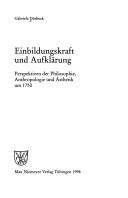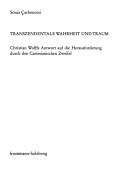| Listing 1 - 2 of 2 |
Sort by
|

ISSN: 00817236 ISBN: 3484181486 3110891727 9783484181489 Year: 1998 Volume: 148 Publisher: Tübingen: Niemeyer,
Abstract | Keywords | Export | Availability | Bookmark
 Loading...
Loading...Choose an application
- Reference Manager
- EndNote
- RefWorks (Direct export to RefWorks)
Die Arbeit untersucht, wie die Einbildungskraft als Vermögen zwischen Empfindung und Verstand in verschiedenen Kontexten der Moralphilosophie, Psychologie, Physiologie, Anthropologie, Ästhetik und Poetik in der zweiten Hälfte des 18. Jahrhunderts als Problem erörtert wurde. Dieser Prozeß wird unter Rückgriff auf das frühaufklärerische Schrifttum (Malebranche, Shaftesbury, Thomasius-Schule, Wolff) in begriffs-, wissens- und wissenschaftsgeschichtlicher Perspektive rekonstruiert. Ein Schwerpunkt liegt auf der vordisziplinären Anthropologie der Aufklärung. Es wird gezeigt, daß die Aufwertung der 'unteren Seelenkräfte' eine Neukonzeption des psychophysiologischen Zusammenhanges verlangt. Hierbei kommt dem Halleschen Diskussionskontext von Medizin und Philosophie um 1750 eine zentrale Bedeutung zu: in der Kontroverse von animistischen und mechanistischen Modellen der Empfindung wurde sowohl die Frage der psychischen Wirksamkeit der Einbildungskraft auf den Körper als auch ihrer physiologischen Determinierbarkeit verhandelt. Problematisch war vor allem die mögliche ausschweifende, regellose Wirkung der Einbildungskraft, die detailliert an den Gegenständen von Traum, Schwärmerei und Wahnsinn auseinandergesetzt wurde. Die daraus folgende Forderung nach einer Kontrolle der Assoziation der Ideen erstreckte sich auch auf die vermögenspsychologisch fundierte Ästhetik und Poetik, die sich die Verbesserung der Einbildungskraft durch eine sinnlich-ästhetische Erziehung zur Aufgabe machte.
Imagination (Philosophy) --- Aesthetics, Modern --- History --- 18th century --- Aesthetics [Modern ] --- Imagination (Philosophy) - History - 18th century --- Aesthetics, Modern - 18th century --- Aesthetics --- Philosophy

ISBN: 3772813488 9783772813481 Year: 1991 Volume: 5 Publisher: Stuttgart: Frommann-Holzboog,
Abstract | Keywords | Export | Availability | Bookmark
 Loading...
Loading...Choose an application
- Reference Manager
- EndNote
- RefWorks (Direct export to RefWorks)
The problem of the difference between reality (or truth) and a dream and its development from Descartes to Kant became an issue in the doctrine of transcendental truth, the central part of Wolff‹s ontology and cosmology. This work presents Wolff's theory of truth and dreams from three points of view. It begins with the confrontation with scholasticism and with Cartesianism as well, then with regard to the development of a new meaning of the term transcendental; and in conclusion refers to the theory of thesomnium objective sumptum, the dream in a metaphysical sense. In addition, the impact of Wolff's didactic work is studied with regard to the Wolff school as well as the critical examinations of Wolff (Crusius, Lambert, Kant).
Truth --- -Transcendence (Philosophy) --- -Imagination (Philosophy) --- -Knowledge, Theory of --- -#GROL:SEMI-1-05'17' Wolf --- Epistemology --- Theory of knowledge --- Philosophy --- Psychology --- Conviction --- Belief and doubt --- Skepticism --- Certainty --- Necessity (Philosophy) --- Pragmatism --- History --- -History --- -Wolff, Christian Freiherr von --- Transcendence (Philosophy) --- Imagination (Philosophy) --- Knowledge, Theory of --- Wolff, Christian, --- #GROL:SEMI-1-05'17' Wolf --- Volʹf, Khristian, --- Volʹff, Khristian, --- Von Wolff, Christian, --- Wolf, Christian, --- Wolff, --- Wolffens, Christian, --- Wolfins, Christian, --- Wolfius, Christianus, --- Wolff, Christian --- Von Wolff, Christian Friedrich --- Wolffius, Christianus --- von Wolfius, Christian --- Volfio, Cristiano --- Wolf, Chrétien --- Truth - History - 18th century --- Transcendence (Philosophy) - History - 18th century --- Imagination (Philosophy) - History - 18th century --- Knowledge, Theory of - History - 18th century --- Wolff, Christian, - 1679-1754
| Listing 1 - 2 of 2 |
Sort by
|

 Search
Search Feedback
Feedback About UniCat
About UniCat  Help
Help News
News